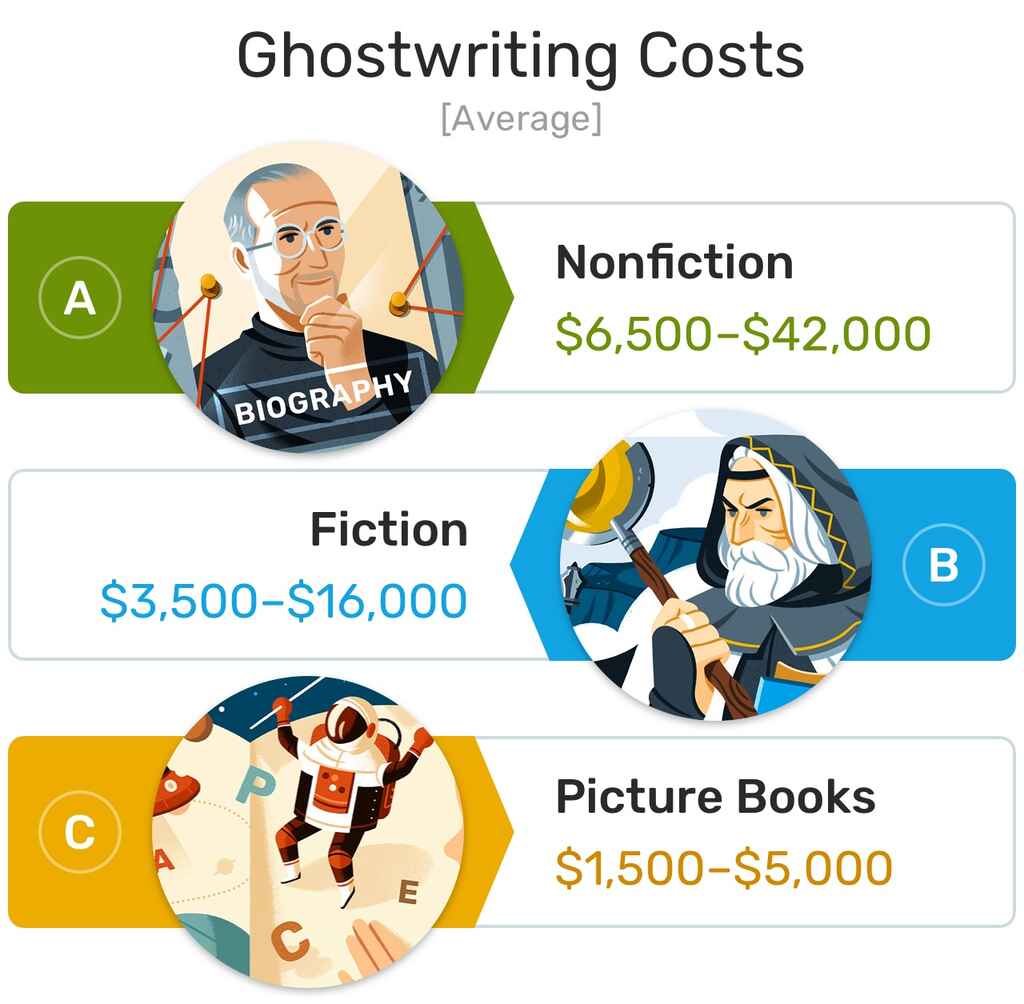Blog • Understanding Publishing
Last updated on Oct 14, 2025
How Much Does It Cost to Hire a Ghostwriter? [Rates and Fees]
Dario Villirilli
Editor-in-Chief of the Reedsy blog, Dario is a graduate of Mälardalen University. As a freelance writer, he has written for many esteemed outlets aimed at writers. A traveler at heart, he can be found roaming the world and working from his laptop.
View profile →A ghostwriter’s help can be invaluable in researching, outlining, and writing the book you've always dreamed of. But securing their services requires thoughtful budgeting.
In this article, we look into how much it costs to hire a ghostwriter, drawing insights from hundreds of collaborations across diverse genres on our marketplace. If you’re curious about how much you can expect to pay, then read on.
💸
What will it cost you to hire a ghostwriter?
Find out here! Takes 10 seconds.
Average ghostwriting fees
According to Reedsy data from 2025, a professional ghostwriter costs between $6,500 and $42,000 for nonfiction books, $3,500 to $16,000 for novels, and $1,500 to $5,000 for picture books. The pricing will depend on the ghostwriter’s experience and your specific book genre.

Here is a breakdown of the average cost range for book ghostwriting by genre and word count:
|
Genre |
Cost range |
Average Word count |
|
Biographies & Memoirs |
$12,000 to $42,000 |
75K |
|
Business & Management |
$8,000 to $32,000 |
60K |
|
Self-Help |
$6,500 to $26,000 |
52K |
|
Fantasy |
$4,500 to $16,000 |
80K |
|
Science Fiction |
$4,500 to $16,000 |
67K |
|
Action & Adventure |
$4,000 to $16,000 |
68K |
|
Middle Grade |
$3,500 to $15,000 |
43K |
|
Picture Books |
$1,500 to $5,000 |
2K |
Biographies and memoirs top the charts as the most in-demand genres for ghostwriting, closely trailed by business and self-help books. This is because many authors seeking ghostwriters aren't natural wordsmiths but rather have interesting stories and valuable ideas to share.
Q: What costs must ghostwriters consider when pricing a project?
Suggested answer
It took me awhile to decide on my rates when I began ghostwriting. Here are the costs and tother things I took into consideration.
- How many hours on average does it take you to write a novel from start to finish? Assuming you’ve written a few books, take a few minutes and do some math and figure out how long each one took you. If you aren’t the type to track your daily work, that’s fine: I’m sure you can still get a solid estimate here. How many months did it take? Include all the brainstorming and outlining time, not just the drafting. On average, how many hours did you write per day? Come up with a range, at the very least, so you have some numbers to work with.
- What do you consider to be a fair hourly rate? No one can decide this but you (if you've already Googled ghostwriting rates, you know they're all over the place). From there, I suggest using the numbers you figured out in #1 to come up with an average. For example: $75/hour, estimating 35 hours per every 10,000 words, works out to $2,625 per every 10,000 words. You *could* charge by the hour, as in hey, this is $75 per hour until the book is done...but from the client’s perspective, they just won’t have any idea as to what that final total will be, and neither will you! So I think it’s best to use your hourly average to calculate a fee, then base that fee on something more concrete like word count or page count.
- This is the trickiest part, and the reason (in my opinion) rates are all over the place. You have to figure out what ghostwriting this book is worth TO YOU. What do I mean by that?
- First, where’s the rest of your money coming from right now? Full time teaching job, freelance copywriting, driving for Uber, pulling shots at Starbucks - when you get your first client and you have to write a book on a deadline, what work are you going to have to cut down on over the next few months, and how much is that going to cost you?
- Second, and this is where we get really speculative: consider the creative work you will put into this book, and consider the fact that someone else will hold the copyright. You are a ghost. You may be credited, but there is no obligation to credit you. You will never receive royalties. This rate is IT.
I suggest that you not be too humble when setting your rates. I think the instinct when we’re first starting out in a new field is to discount our services, to undercut the competition. But when you do that you’re just undercutting yourself. Because you have written books. You might be new to ghostwriting novels, but you aren’t new to writing novels.
I hope that's helpful!
Michelle is available to hire on Reedsy ⏺
I've been ghostwriting through Reedsy for the last four years and off and on before that for clients I met through my own work. For me, there are three primary considerations for fiction:
- How much does the client have written on the novel?
- How much time will it take me to write the book?
- Does the idea intrigue me?
If I find the idea intriguing and the idea is all the client has, I usually propose a synopsis based on the 15 beats of storytelling. It runs around 35 pages and essentially provides a blueprint for writing the novel. I do this synopsis for my own work. It means that halfway through the writing, I won't have to toss out 100 pages because the story no longer works. With a synopsis that outlines the 15 critical beats of a story, the client can then either write the book herself or turn it over to the ghostwriter. The synopsis saves time and ultimately saves the client money.
For non-fiction, the consideration is different. It's helpful if the client presents an outline of the chapters, even if it's rough. If I have to spend hours on zoom with the client to hear a story, the cost is higher.
Sometimes, when a client says they don't have money to cover the price I'm asking, we negotiate. But in the end, the main consideration for me is time. Will it take me two months or six to write the book? When I take on a ghostwriting project, I put my own work on hold and focus on the client's project.
Trish is available to hire on Reedsy ⏺
Because of the extensive research and interviewing involved in writing these books, they are on the pricier side. While novice ghostwriters may charge around $10,000 per project, more experienced ones cost upwards of $40,000, and superstar ghosts can even charge six figures.
Want to learn more about writing about your own life? You can check out our guide to writing a brilliant biography here, or learn how to pen a moving memoir over here.
If, instead, you’re dreaming of learning the craft of novel writing with the help of a ghost, expect to pay between $4,500 to $16,000 for common genres like fantasy, sci-fi, and adventure or slightly less for shorter middle-grade books.
Last but not least, picture books fall between $1,500 and $5,000 per project, due to their limited word count.
Charging per word, hour, or project
Based on Reedsy data, ghostwriting rates for book writing can range from $0.10 to $2 per word, $35 to $140 per hour, or $1,500 to $42,000 per project.
Q: What are the most effective ways for prospective clients to assess whether a ghostwriter can capture their unique voice?
Suggested answer
Great question – I have to answer it in a roundabout way. I always say this to my authors: ‘Look, the relationship between ghost and author is really important. We’ve got to get it right. The only way to see if it’s going to work is to give a shot. I’ll sit with you, I’ll do a couple of interviews. If you feel things aren’t right, or if I feel things aren’t right, we’re both free to walk away at any time.’
That freedom creates trust, and that trust allows the author to talk freely about the things they’re most passionate about, the things that made them want to write a book in the first place. And from my point of view, listening to someone talk freely about the things that they’re most passionate about is always so compelling, so absorbing. The words they use, the idioms they use, the way they express themselves start to sink in, and when it comes time to write their story, what emerges is their story in their words. Get the relationship right and the voice will come.
It’s also important to point out that this is an iterative process. A first draft is just that – it’s designed to be pulled apart and redone, and redone again until we arrive at a text that the author can be proud of. Say: ‘Don’t censor yourself. Talk freely. You’ll have plenty of time to review what I write. Nothing will end up in the final draft that you’re not happy with.’
So you can’t really demonstrate that you can get their voice at the beginning of a project. You can offer referees of course – I always do, but really getting the voice right begins with trust and flows from that.
For the record, I’ve never had anyone walk away. A couple of interviews in and they’re starting to really enjoy the process. That’s another thing – authors love the process after a while. It’s such a rewarding thing to talk freely about things you’ve done, the things you feel most passionate about.
John is available to hire on Reedsy ⏺
Ooh, that is such a good question!
One of the hardest parts of choosing an editor is trusting that they’ll get you – your tone, your rhythm, your way of telling a story-that’s what “voice” is, after all, the thing that makes your writing yours.
So how do you know if an editor can capture it rather than flatten it?
A few practical ways can help.
First, ask for a sample edit. Even a page or two will tell you a lot. Do their suggested changes make your writing clearer and sharper without stripping away your personality? If you read it back and it still sounds like you – just a more polished version – that’s a good sign.
Secondly, pay attention to how they listen-and, for me, listening comes first as a ghostwriter. A good editor doesn’t just correct or 'get technical'; they ask questions about your intent, your audience, and the effect you want to create.
If they’re interested in what lies behind your words, they’re far more likely to respect your voice on the page.
Thirdly, read their testimonials or portfolio. Past clients will often mention whether an editor was sensitive to style and tone. If you see repeated praise for “keeping my voice intact,” that’s worth noting.
Finally, trust your instincts after a conversation. If you feel heard and understood in person, that relationship usually translates well into the editing process. This is your book and you will be telling your story from your heart-your writer needs to be able to understand and absolutely empathise with that fact.
In the end, the right editor won’t make your work sound like theirs. They’ll make sure it sounds like you – at your very best.
YOUR voice.
Edward is available to hire on Reedsy ⏺
Having failed the Vulcan mind-meld certification course, I know only one way to capture an author’s voice. Interviews. Lots of them. Here’s what I tell every prospect … As a ghostwriter, I will spend lots of time interviewing you. And thanks to these interviews, I’ll acquire much of the book's content, as well as your unique point of view, key messages, and ways of speaking. Every interview is recorded and transcribed, so when it comes time to write the manuscript, I can simply copy, paste, and edit/rewrite large portions of the transcripts. The book’s voice will match yours for the simple reason that much of the book is your actual voice, answering questions and telling stories. I’ll probably spend as much time (or more time) planning the interviews, crafting interview questions, and listening intently as I’ll spend writing the book. In short, I capture authors' voices by recording and using many of their own words. That’s my “trick.” Which really isn’t a trick.
Peter is available to hire on Reedsy ⏺
Since skilled ghostwriters adapt their writing to match their clients' voices, taking a look at multiple samples of their work to confirm that different assignments sound different is one way to see if a ghostwriter can capture your voice. If all of their samples sound the same, then they're writing in their own voice and not their clients'.
Marcia is available to hire on Reedsy ⏺
Two simple elements help me capture my client's voice:
- Have at least one phone/Zoom call and hear their voice
- Start the editing/ghostwriting process with a small section, and identify where I amplified their unique voice, and where I missed the mark.
This feedback is essential for both parties.
Michael is available to hire on Reedsy ⏺
For full-scale projects, most professionals charge a flat fee that covers various aspects of the work, from research to writing to manuscript revision, and then charge an hourly fee if any extra work is required. It’s highly unlikely for ghostwriters to charge per word or hour, unless you hire them for a short book or if you simply need them to revise or finish a part of your manuscript.
👻 Hire a pro ghostwriter on Reedsy
David P.
Available to hire
Nearly 50 books in print. Retired university teacher. Latest: THE ACADEMY, St. Martin's; WRITING IN THE AGE OF AI, Northampton House Press.
Jane R.
Available to hire
I'm a children's book specialist with nearly 30 years' experience of writing and editing everything from Winnie-the-Pooh to Minecraft.
Sean E.
Available to hire
Internationally best-selling author, editor, and writing mentor who wants to help make your dream a reality.
Who pays for a ghostwriter?
If you self publish your own writing, the cost of a ghostwriter will fall on you, whereas a traditional publisher will usually cover the fee — depending on what stage the writer is brought on board at.
Traditional publishing
If you've already signed a publishing deal to produce a ghostwritten book for a publisher, congrats! Your publisher will be covering the cost of the collaboration. If you're yet to secure a deal, but still want to pursue the traditional publishing route with the help of a ghostwriter, you may have to pay for some of their services yourself.
You could hire a ghostwriter to write a book proposal that you, the ghostwriter, or an agent can submit to publishers. The ghost may then write the whole manuscript once a publisher has been secured.
The typical book proposal for a traditional publisher is usually between 5,000 and 10,000 words 一 it contains a short synopsis, chapter breakdowns, and market research, as well as a sample book chapter. According to our data, the cost for a proposal ranges between $2,000 and $7,000.
Q: What methods do you use to capture a client’s voice in your writing?
Suggested answer
Capturing a client’s voice is one of the most important aspects of ghostwriting. Here's what I do:
1. A detailed onboarding questionnaire.
Every new client completes a style/voice questionnaire that asks:
- What books would you want yours compared to, and why?
- Who are your favorite authors for prose?
- What five adjectives would you use to describe this story?
This gives me a clear starting point for tone, rhythm, and narrative personality.
2. A dedicated Zoom or phone call to discuss voice and style.
It’s often easier for clients to articulate their preferences out loud, and I listen closely for word choice, pacing, and the kinds of metaphors or examples they naturally gravitate toward.
3. An optional sample draft after outlining.
Once we’ve created the project outline, I may draft a short sample section in the proposed style. This gives the client an opportunity to confirm that the voice feels authentic before I proceed with the full manuscript.
Michelle is available to hire on Reedsy ⏺
Capturing a client's voice starts with listening. Effective listening is fueled by curiosity and empathy. Authentic curiosity allows me to listen with real interest. As I saturate myself in the clients' ideas and stories, I grow to empathize with them. From this soil bloom the final words on the page--from pacing to word choice to style. As a ghostwriter, my focus on attentive listening means I rely heavily on interviews. I take extra time to converse with my clients and build rapport, so we can discover their writing-style identity identity together--because it all starts with their voice.
Mark is available to hire on Reedsy ⏺
Great question! The interview process is the first step. You're not just collecting the material for the book, you're also tuning your ear to their modes of speech. These days too - depending on the project - I use AI to transcribe the interviews, but AI can't manage every accent, so I always run through the transcripts a second time to make sure that they're accurate, and that process again sinks the client's voice deeper into my subconscious. So when it comes to the writing stage, I'm super-familiar with the client's idioms and vocabulary, so I can write away naturally in their voice.
John is available to hire on Reedsy ⏺
Every ghostwriter has their own tricks on how to capture the voice of an author while writing. I’m a big stand-up comedy fan, so I like to think of myself as doing an impression of the author as I write. Many of the best impressionists–Dana Carvey is my favorite–usually have a word or a phrase that gets them into the character. I try to do the same with my clients. Sometimes it’s not even anything spoken. I can imagine the person on a stage gesticulating, for example, to help me get into their voice.
But I think beyond those tricks, we can put a little more structure to the process of “voice." By breaking down what voice is, we can help to elevate it for our clients and reach the level of a true collaboration.
I tend to approach capturing voice with three different components, which I walk through with each of my clients:
- Structure: Some authors will have different sentence structures than others. Some may like having short, declarative sentences or paragraphs, vs. long ones with lots of detail. Can I use conjunctions or not? Do you want to ask the reader a lot of questions, or be more declarative? Do you want to use bulleted or numbered lists, or rely more on paragraph flow?
- Tone: This is probably the component most closely resembling what clients mean when they talk about “voice.” This is the feeling readers get as they read the writing–the more “art” than “science” component of the manuscript. But even tone has some standard components to discuss with a client: Should the language be formal or informal? (This relates to the conjunction question, above.) Can you swear, or not? Should things be up-beat, or more somber?
- Content: This may seem unrelated to voice, but the type of information you convey through a book or piece of writing is a big part of the voice of the author. The content itself matters. You can tell funny, inspiring stories, or stories that scare readers. You can include a lot of research or rely on broad anecdotes. A book about young leaders in politics written by a demographer would contain very different information than one written by a comedian. This component essentially helps determine what they want to say and why.
All of these components combine to make a unique product that the client can point to as wholly their own. Working through these different elements with a client can help to establish the voice up front and make a more seamless process for creating an excellent manuscript.
Jeff is available to hire on Reedsy ⏺
Capturing a client’s voice is about tuning in to the subtleties of how they express themselves. I usually start with conversations-and listening to them is key- whether in person, on a call, or through recordings, because hearing someone speak naturally tells me so much about their rhythms, turns of phrase, and personality.
I’ll often replay those conversations, noting expressions or patterns that feel distinctly “them.”
If they’ve written before, I’ll study their existing work to pick up tone and style.
If not, I’ll sometimes ask them to write freely, without worrying about structure, just so I can hear their unfiltered voice on the page.
From there, I weave those elements into the writing, always checking back in to make sure it feels authentic. I’ll share drafts early, invite honest feedback, and adjust until the client feels their voice shines through.
It’s a balance: my craft provides the polish and structure, but the soul of the piece always belongs to the client.
My role is to amplify their voice, not replace it.
Edward is available to hire on Reedsy ⏺
I actually use a unique device of my own creation: the Voice Spectrum. When I work on a book, I conduct extensive interviews with the author and based on those interviews, I determine where their personality, vocabulary, ideas, and affect fall on five 1-10 scales:
- Sophisticated———Simple
- Easygoing———Intense
- Formal———Casual
- Serious———Funny
- Humble———Arrogant
Once I have their scores, I calibrate that to the words and phrases I will and won't use in writing their manuscript. For example, for an author who scores high on Formality, I won't use slang at all. For an author who scores high on Funny and Arrogant, I'll lean into some sly egotism but also into self-deprecation. This is a formal way to manage voice, which often too nebulous and vague.
Tim is available to hire on Reedsy ⏺
I try never to forget the single most important rule in ghost writing: it isn’t my book. It’s the author’s. I can give advice. I can say, “We’ll do that if that’s what you want, but before we do I want to tell you what I see as the drawback to that approach. And then I will say what the drawbacks are. But, if the author says, “I hear you. I understand what you say. But I still want to do it my way,” then the author’s way is how we do it. But one thing I try to insist on is that, before the author and I agree to collaborate, we will first talk on Zoom. I do that because chemistry is vital in a ghost writing relationship: do the author and I get along well enough to bring this project to a successful conclusion? (A successful conclusion is one that produces a book agents will want to represent, publishers will want to publish and readers will want to read). And there may be a better way to test that chemistry than talking to someone while looking them in the eye, but I haven’t found it yet. I’ve been ghost writing since 1990 and the development of software like Zoom has enabled me to take on projects I would probably have avoided in earlier days. Sometimes, the Zoom doesn’t go well. If that happens, I don’t say, “No, sorry, you’re not the kind of person I want to work with” – there’s no need to give offence – but I will find a reason to say, “This project may go extremely well but it simply isn’t for me.” A byproduct of the Zoom is that I start hearing how the author speaks. That isn’t the same as how the author would write, but it’s a start. And then I tell the author that we may well write the first chapter or the first two chapters 3 or 4 times before we get it the way the author wants it and that it’s natural we should: the author has her or his own voice and my job is to “get” it. Once I “have” it, the rest of the book usually comes a lot more quickly.
It’s been said that a good ghost writer has no ego. I don’t believe that, because I don’t believe the person without an ego exists. What I do believe is that good ghost writers put their ego to one side when writing someone else’s book – which brings me back to the beginning. It isn’t my book. It’s the authors.
John is available to hire on Reedsy ⏺
I ghostwrite a lot of memoirs especially. I look for consistent word choice and sentence structure, and listen for specific recurring phrases or mannerisms. Do they say "Gosh," "Oh God," "Oh Lord," or "Oh Lordie" for instance. Do they they say "Mom/Dad," "my mom/my dad," or "my mother/my father." Are they more likely to say "I departed for the airport" or "I left for the airport." Do they create a sentence in brief phrases, like "Too much!" or in a full sentence, "It was too much." In stylizing their writing, they have the option to change anything I write that doesn't adhere to their voice.
Sharon is available to hire on Reedsy ⏺
If your book is commissioned in full, you’ll usually continue to work with the same ghostwriter to turn your proposal into a full manuscript. Again, this will be at the expense of the publisher. If instead you don’t get a deal, you can work independently with your ghost and pay them in full. In this case, the work already paid for the proposal (e.g., the draft of one chapter) will be deducted from the final fee.
Note that this method of writing a proposal and securing a book before the manuscript has been written applies mostly to the genre of nonfiction, as book proposals aren’t part of the fiction publishing process. That said, even for novels it’s common to hire a ghost to work on a book outline and sample chapter to test their skills and gauge whether you want to work with them or not. While traditional publishers would have a list of vetted writers and samples, in self-publishing you would have to start with this step.
Self-publishing
The self-publishing route will give you complete creative control over your book, but you’ll be entirely responsible for finding the right ghostwriter, negotiating the scope of work, and, of course, paying for it.

Freelance ghostwriters will have varying ways of organizing payment. Generally, you can expect to pay part of the fee upfront and the rest in installments. The initial fee ensures commitment from both parties and mitigates the risk involved in embarking on a costly and demanding project without guaranteed success.
The other stages at which you pay are negotiated and may be determined by the length of the book or the kind of project you’re working on — a memoir might have different milestones than a novel. You might decide to pay them by chapter, or after the first half of the draft is finished. Some people prefer to wait until they have a completed first draft. Whatever makes the most sense for your collaboration and publishing timeline.
Q: How do you build an understanding of your client’s voice and vision for their project?
Suggested answer
Just by listening to them, and asking all the same questions that a future reader is likely to ask.
Andrew is available to hire on Reedsy ⏺
Before I do anything else with a client, I work to understand their goals. Knowing what they want to achieve with a project helps me to understand not only their vision, but how they just present themselves to the reader through their voice.
When it comes to a book, or some other type of writing, many clients jump into the project without much thought to the purpose. Sure, they know what they want to do - write a great book, write a great op-ed, start to write more frequently on LinkedIn - but rarely do they have a good sense of why they want to do all these things.
You need to use your writing product for some goal beyond publication. These specific goals can be anything - from increasing revenue to securing new clients to landing a keynote gig. Clients who have a specific target audience for an op-ed (and I mean specific, like one or two potential clients) are usually able to have a much better return on investment than generic brand-building goals.
How do I work with my clients to identify their goals? I use the following questions:
- What is the core message/idea(s) you want to communicate? What do you want readers to take away from your writing?
- Why are you the one to communicate these ideas?
- What is your target audience?
- What does your core audience want?
- What are they motivated by?
- What are they afraid of?
- What are they used to hearing/reading? Do you want to break that pattern, or fit within it?
- What are you offering them they can’t get elsewhere?
- Who are similar leaders you admire and aspire to? How will what you say be similar to what they say? How will it be different?
- It’s five years in the future and you have achieved everything you wanted to and even more. What does that look like?
These help me identify the more straightforward goals, but also the things the client might not be thinking about. The audience questions, in particular, help identify potential areas that the client may not have thought about - a new group of people to target, or an opportunity they hadn’t considered.
Jeff is available to hire on Reedsy ⏺
For me, it always begins with listening.
Genuinely listening.
Every client comes with a story, an idea, or even just a spark, and my first priority is to understand not just the project itself but the person behind it.
I’ll ask questions, but more importantly, I’ll give space for people to share what matters to them: their experiences, their goals, and the feeling they want their readers to take away.
From there, I immerse myself in their world. Sometimes it’s through notes, recordings, or conversations; other times it’s through reading what they’ve already written. I pay close attention to the language they naturally use, the rhythm of their storytelling, and the themes they keep coming back to. Those details often reveal the heartbeat of their voice.
I see my role as a collaborator, not a dictator of words. I may bring structure, craft, and experience, but my job is to make sure the finished work sounds like them, not me.
That means checking in, sharing drafts, and refining until we both feel the project is authentic to their vision.
In short: I approach every project with empathy, patience, and respect. It’s their story, its YOUR story-I’m simply here to help them or you tell it in the most powerful, true-to-them way possible.
Edward is available to hire on Reedsy ⏺
Interviews, interviews, interviews! The deeper we go in conversation, the more aligned we'll be.
A key part of my process is ensuring I understand your goals for the finished product. You may not even know what you want to do with the your book! Part of my job is to introduce you to the publishing landscape and give you a smorgasbord of options.
When we start writing, there's... Drumroll please... More interviews! Video call interviews allow me to capture the rhythm of your natural speaking voice. They also give me a chance to ask you unexpected questions. Sometimes, the answers you give off-the-cuff become the most honest and authentic parts of the book.
Kate is available to hire on Reedsy ⏺
I’ve said elsewhere that, before the author and I agree to collaborate, we first talk on Zoom because chemistry is vital in a ghost writing relationship: do the author and I get along well enough to bring this project to a successful conclusion? (A successful conclusion is one that produces a book agents will want to represent, publishers will want to publish and readers will want to read). I usually start the conversation by asking, “Why do you want to write this book?” That’s a question I genuinely want to know the answer to because it will tell me a lot about the author’s motivations and how likely the author is to give the project the time it needs. (In my experience, the most common reason for a ghost writing project to fail is that the author has not understood just how much time they will have to give the writer. I like to work by sending the author batches of 3000 to 5000 words at a time and then zooming a couple of days later to talk about what the author liked, what the author didn’t like, and what needs to change before going on to what I’m going to write next. I tell authors that, and I suggest that, if zooming with me once or twice a week is going to be difficult, we should probably not take this project forward). One of the things I’m looking for in that first introductory zoom is: do I like this author? Will we be able to work together? But I’m also looking for things that may well not be said. Things to do with the author’s vision. What they are going to want me to write, and whether I’m going to be happy writing it. If I get a negative feeling at that point I will never say, “No, you’re wrong, I don’t agree with your vision,” because I hope I don’t have that level of arrogance – but I will say that I’m sorry but I think there are other ghost writers who would be better suited for this project. Just a few days ago I was talking to someone about a book he wanted to write and I realised that it was a revenge project – he felt he’d been badly mistreated and he wanted to get his side of the story into a form where he could give it to people aware of his history so that they would understand his point of view. I understood that wish completely, and he may well have been entirely right, but I didn’t want to be part of a revenge project. Fortunately, he decided of his own accord that I was not the writer for him and we parted amicably.
John is available to hire on Reedsy ⏺
Payments in installments also allow you to walk away from the relationship if it doesn't work out or you change your mind. On the Reedsy marketplace, we offer mediation so that if a collaboration does go off track, you have even more protection than if you directly hired the ghostwriter. Regardless, the most important thing is that you are both clear about what is expected and that there is an atmosphere of mutual trust.
Indirect costs of ghostwriting
Keep in mind that the project fee may not be the only cost involved with hiring a ghostwriter. You have to consider additional expenses that could arise from interview-related activities, legal considerations, or the need for further editing services. Let’s go through them one by one.
Q: What additional costs can ghostwriting clients expect on top of their original quote?
Suggested answer
Just the ghost's travel costs, and then the costs of publishing.
Andrew is available to hire on Reedsy ⏺
Most clients begin to gather quotes for publishing a book and start with the writing, since that's the first step. A ghostwriter will provide a quote for their work required to gather background information, interview the author and related characters, draft chapters, and then edit the chapters for hand-off to the publisher.
From there, the author can choose to work with a one-stop-shop publisher that will handle copyediting, proofreading, cover design, page layout, indexing, printing, and distribution, or they can look for individual professionals who will complete each of those tasks. In that case, each professional will provide a quote for the cost to engage them. The total can range from a few thousand dollars on top of the ghostwriter's quote, to tens of thousands of dollars, depending on any ancillary marketing services you may choose to invest in.
Marcia is available to hire on Reedsy ⏺
Travel costs
If your book requires in-person interviews or research-related travel, you’ll have to cover the budget for the ghostwriter transportation, meals, and lodging, which could potentially tally up to an additional few thousand dollars.
Transcription costs
You may also need to pay for the interviews transcription costs. As ghostwriter Tom Bromely points out, if you don’t want your recordings accessible in the public domain or stored on personal devices, opting for more premium services becomes necessary. “While many authors are comfortable with ghosts utilizing budget-friendly tools like Descript, those concerned about privacy may prefer them to use more secure tools like rev.com, which provides human transcription services.”
Legal costs
Then there’s the legal side of it. Before starting the collaboration, you’ll need to draft a contract defining deliverables, timelines, revision agreements, payment schemes, but also copyrights and non-disclosure agreements, among other things. You could use a basic contract, or hire the ghost through platforms like Reedsy, which offers an automated contract that can be edited with additional clauses.
But if you have more complex considerations or require legal advice (e.g., for a libel read of your book, if it’s contentious) getting a lawyer to draft the contract may be a wise move. Unless you’re already paying for a lawyer, this will cost you some money.
Copy editing costs
Finally, while pro ghostwriters will hand you a polished finished manuscript, you can’t expect them to do the other types of editing like cost editing and proofreading. Like any other writer, they’re too close to the work to notice every little mistake and typo. Just as if you wrote the manuscript, the best practice is to have someone else polish it for publication.
Q: What steps do publishing professionals take to ensure client confidentiality and discretion in an author's work?
Suggested answer
First of all, it is common that your agreement with the subject will include language concerning confidentiality. Second, your reputation should speak for itself.
Tom is available to hire on Reedsy ⏺
For me, confidentiality isn’t just a professional obligation, it’s a matter of personal integrity.
When someone entrusts me with their story, I see it as exactly that: a gift of trust.
The first step I take is always to make it clear that everything we discuss, whether written down or spoken, stays between us-that includes, surprising as this may seem, given someone is telling me their story that when they say something is 'off the record' (ie) is not to be included in the book, then not only do you acede to their request, you never make use of that information elsewhere-however 'juicy' it might be!
On a practical level, that means keeping files secure, not sharing material without permission, and, where appropriate, putting formal agreements in place.
But beyond the paperwork, it’s about how I conduct myself.
I listen without judgment, respect what’s private, and never forget that I’m being trusted with someone else’s voice, memories, and experiences.
Writers need to feel safe if they’re to be honest on the page. My role is to protect that space & with discretion, care, and the quiet understanding that what’s shared with me is theirs until they decide otherwise.
Edward is available to hire on Reedsy ⏺
Similar to how you would approach a manuscript you wrote yourself, the best practice is to have someone else look at it and polish it for publication. On average, you'll pay just shy of $2,000 to copy edit a nonfiction book of 75,000 words.
However, you usually have some rounds of structural edits included in your project fee. So at least you won’t have to pay for those. Once you receive the first draft, make sure to thoroughly review it, perhaps even asking friends and second readers to do so, so that the final manuscript will only require a final proofing before publication.
Will ghosts work for a share of the royalties?
The brief answer is no, particularly if the client is not an established publishing house. If the ghost will spend three to six months working for you (and forgoing other work), they are unlikely to defer their salary when there’s no guarantee the project will be a commercial success.
Very few books make much money from sales — both in self-publishing and even in traditional publishing. You are quite unlikely to earn back the money that you are going to spend on a ghostwriter from sales alone, especially enough to split the royalties with them. It’s better to think of the money you spend on a ghostwriter as an investment. They will help you achieve your goal and publish a book you both can be proud of.
Ultimately, there’s no set price for how much a ghostwriter will cost. Every project is unique and requires different skills and investments from you and any potential ghost. One way to get an estimate on Reedsy is to request quotes from ghostwriters. This will give you an idea of how much it might cost to work with one, and turn your dream of publishing a book into a reality.






